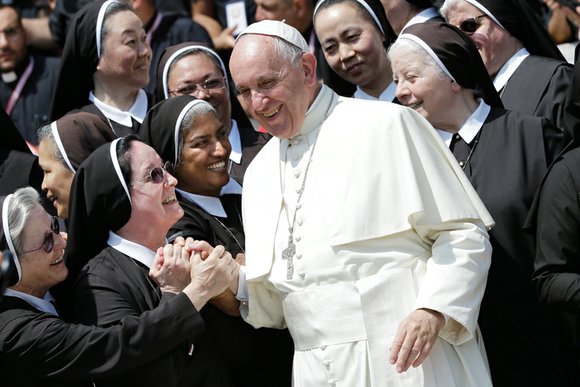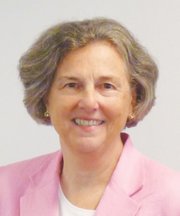Pope names panel to consider women as deacons
8/13/2016, 9:13 a.m.

Free Press wire report
VATICAN CITY
Following through on a pledge he made to a group of nuns last May, Pope Francis has established a special commission to study whether the Roman Catholic Church should take the historic step of ordaining women as deacons.
The Vatican announced Aug. 2 that the pontiff appointed seven men and six women to the panel, a move that quickly reignited the simmering debate about the role of women in the church.
The members of the panel include Dr. Phyllis Zagano, an acclaimed Catholic scholar who teaches at Hofstra University on Long Island and has championed the cause of women’s ordination as deacons.
Another woman on the panel, Sister Mary Melone of the Franciscan Sisters of Blessed Angelina and rector of Rome’s Pontifical University Antonianum, has been a champion of the role of women in the church, the Catholic news site Crux reported.
Crux stated Sister Melone has rejected the argument popular with many traditionalists that ordaining women as deacons would lead down a slippery slope to a female priesthood.
The new panel will be headed by Archbishop Luis Francisco Ladaria Ferrer, currently second in command at the Vatican’s Congregation for the Doctrine of the Faith, which serves as a guardian of orthodoxy.
“After intense prayer and mature reflection, Pope Francis has decided to institute the commission for the study of the diaconate of women,” the Vatican said in a statement.
In addition to Dr. Zagano, the panel includes the Rev. Robert Dodaro, president of the Augustinianum University in Rome, a priest widely viewed as a conservative.
Rev. Dodaro last year edited a book, “Remaining in the Truth of Christ,” which featured essays by five conservative cardinals who sought to push back against moves by the church — and by Pope Francis — to adopt a more pastoral and conciliatory approach to divorcees, among other issues.
Pope Francis first remarked in May that he was willing to consider a commission to study whether women should be deacons. The new panel also will examine the historical role of women in the early years of Christianity.
“There were women ordained as deacons in the early church. That is a historical fact,” Dr. Zagano wrote in a column for National Catholic Reporter in May.
“What they did, where they did it, and how they became deacons are all well-studied. The facts of history cannot be changed.”
Deacons are ordained ministers who can preach or preside over weddings and funerals but cannot celebrate Mass.
As recounted in the New Testament, the role of the deacon was created by the Apostles so that they could deploy ministers specifically dedicated to doing charitable works and thus free themselves to focus on preaching.
In the Catholic tradition, the role of deacon was eventually subsumed into the priesthood and hierarchy, until the Second Vatican Council of the 1960s revived the diaconate as an ordained order open to “mature” men over 35, who can be married.
But many say that order should include women — who have never been ordained at any level in the Catholic Church — because women deacons are mentioned in early church sources. They also said ordaining women as deacons would not necessarily lead to overturning the ban on women priests.
The question has been the subject of previous study by Rome. A theological commission that advises the Vatican in 2002 published a report on women deacons but it drew no firm conclusions on whether they could be ordained or not.
It’s not clear whether anything will come of this new papal commission on deaconesses, or whether Pope Francis would support an opening.
He has called for creativity in ministry but he also has warned against “clericalizing” women and lay people by proposing ordination of some sort as the answer for every problem.
The pope has talked about seeking a broader role for women in the church, and in May told senior members of women’s religious orders he was willing to consider female deacons: “It would be useful for the church to clarify this question. I agree.”
And speaking to reporters in June, Pope Francis bristled at the coverage of his pledge to create a commission, saying he had not made any decisions yet.
“We had heard that in the first centuries there were deaconesses,” Pope Francis said. “One could study this and one could make a commission. Nothing more has been requested.”







